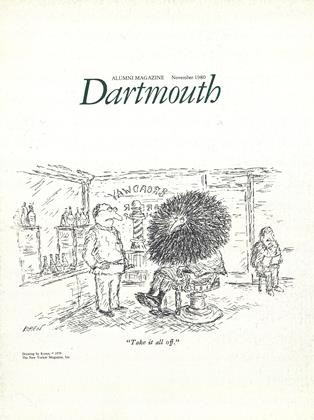If there wasn't much action in Baltimore on September 21, November 4 was a bit more lively in Vermont and New Hampshire. With two gubernatorial, two Senate, and three House races in the bistate region, a lot of people were staying up late on election night. Many of them listened to the latest news on the Dartmouth Election Network. The election network, a production of WDCR/WFRDFM's news division, is without a doubt the station's biggest effort every several years. Phil Weber '82, the station's news director, who is also executive producer and an anchorman for the election network, described the complex operation as follows:
Two-man reporting teams in each candidate's headquarters, 15 all told, transmitted taped or live reports to Hanover via specially installed phone lines. In the station's Robinson Hall studios, editors quickly decided whether to send the story straight to the anchormen, who were on the air, or to file it for the periodic, comprehensive updates. All this while, in the broadcasting booth, two anchormen kept up a constant stream of reportage. The strict schedule called for alternating news of national and local elections with these filed tapes, live reports, and spontaneous commentary from the network's two political experts, government professor Robert Nakamura and English professor Jeffrey Hart. Concurrent with all this activity, several affiliate stations in Vermont and New Hampshire plugged into the continuous six-hour broadcast for any of a number of programming options.
Growing out of coverage of New Hampshire's presidential primary, the Dartmouth Election Network now gears up for a number of major polling dates. Weber explained that the station supports such a massive undertaking because it provides students with an unparalleled experience in professional broadcast journalism. That meant that over 75 students, from reporters to writers to technical staff, took part in the general-election coverage, an operation that was scaled down from even more extensive primary coverage. In February, for instance, the election network set up computer terminals in its Collis Center headquarters in order to keep instant tabulations of precinct returns. On November 4, the Network used U.P.I, tallies and projections because, according to Weber, this election had more of a national focus and, as a consequence, local races lacked a sense of urgency for most listeners. Not willing to lag behind other stations' coverage in any respect, though, Weber had WDCR/WFRD staff at Carter and Reagan campaign headquarters in Washington to provide on-the-spot reports.
As one might imagine, such a complicated system holds a certain potential for foul-ups. Weber recalled the opening of the primary-night commentary segment the first time the network tried instant analysis. Weber turned to Nakamura with the question, "Professor, would you like to comment on the effect the weather will have on voter turn-out and the ultimate election results?" After a long pause, Nakamura, a specialist in American partisan politics, leaned into his microphone and pronounced, "No." Then, of course, there was the time that Dartmouth reporters at Kennedy headquarters preempted the normal election recaps, a rare occurrence arranged solely for major announcements, only to broadcast live the Senator's happy birthday serenade to his daughter, Kara. When the anchormen finally managed to cut off the Kennedy line and get back on the air, the first thing that listeners heard was Nakamura's crackling laughter.
Tootling band veterans augmented the halftime formations during the Harvard game.
 View Full Issue
View Full Issue
More From This Issue
-
 Feature
FeatureHAIR
November 1980 By Dan Nelson -
 Feature
FeatureNow Let Him Praise Emmets
November 1980 By Robert Sullivan -
 Feature
FeaturePostmark: Bucharest
November 1980 By Douglas Reichert -
 Article
ArticleTrusteeship and the Alumni
November 1980 -
 Article
ArticleUnofficial Arbiter
November 1980 By Patricia Berry '81 -
 Article
ArticleWanted: Road-trip Messerly
November 1980 By Parker B. Smith '66
Article
-
 Article
ArticleFOUR PROMINENT LITERARY FIGURES TO ADDRESS ARTS
November, 1922 -
 Article
ArticleGENERAL ELECTRIC COMPANY FELLOWSHIPS IN SCIENCE
April, 1923 -
 Article
ArticleCOLLEGE REPRESENTED AT NUMEROUS INAUGURATIONS
December, 1923 -
 Article
ArticleDARTMOUTH CLUB HOUSE IN NEW YORK CITY
June, 1926 -
 Article
ArticleTrustee Meeting
JANUARY 1932 -
 Article
ArticleTeamwork
OCTOBER 1999 By President James Wright

